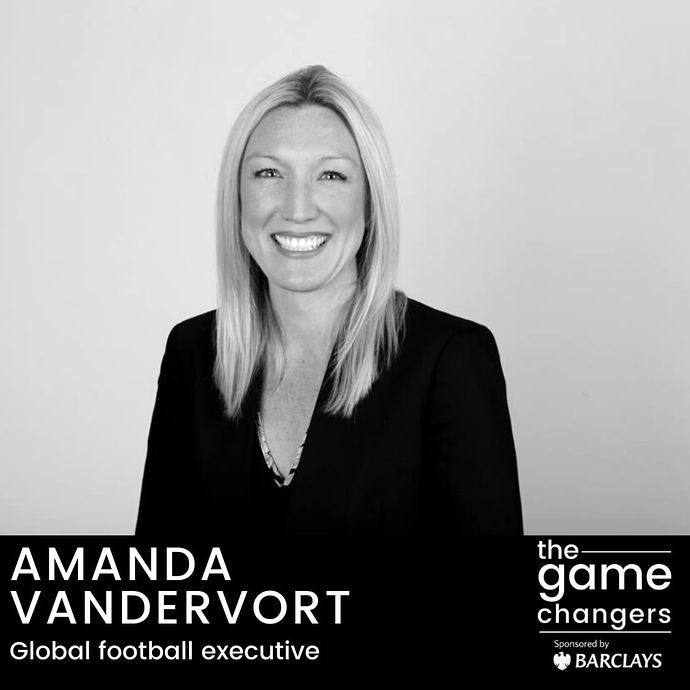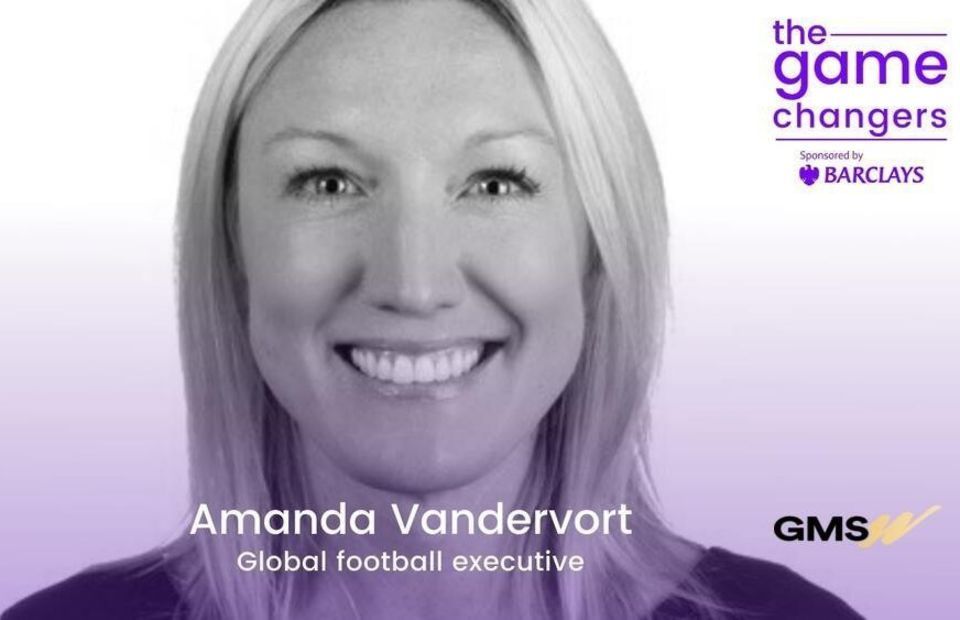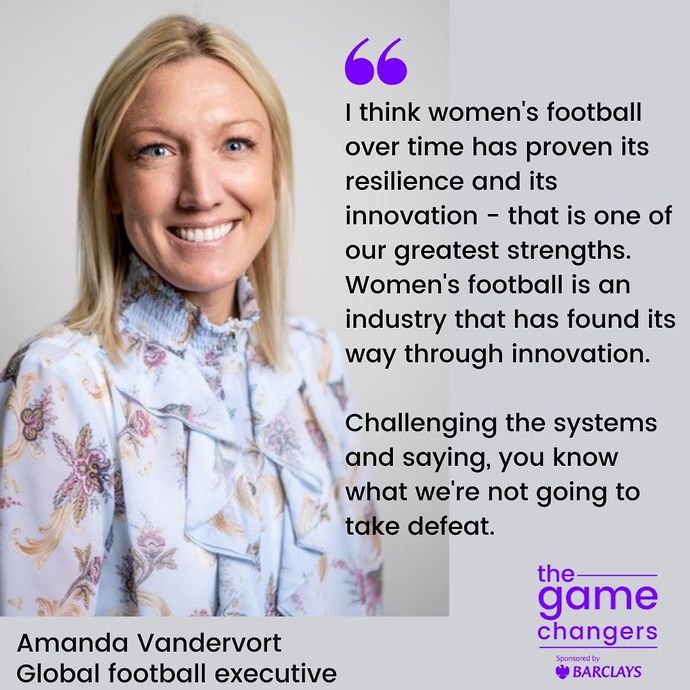This week’s game changers podcast featured Amanda Vandervort, the Chief Women’s Football Officer at FIFPRO, the global football players’ union. In a fascinating interview with Sue Anstiss, CEO of Fearless Women Ltd, Vandervort reveals how football was an important part of her childhood and how she feels a “compelling draw” to growing women’s sports.Reflecting on her early life, Vandervort says that football played a vital role in her upbringing and offered an escape from what was a challenging family life. Her parents are divorced and she found herself living with her mum in Arizona.“I just found serenity. I found serenity in soccer and in training and in committing myself to something. So, I got really competitive about it and it’s become my life since then.” Vandervort is fortunate to have benefitted from being a product of Title IX, –– a federal civil rights law passed in 1972 that protects people from discrimination based on sex.“I reflect a lot on that. I think I am a product of Title IX. It’s a weird term to use, but I do see myself as that. I was quite fortunate.”Asked how she first found herself involved in the sporting world, Vandervort reveals she started as a coach.“I’ve coached since I started playing actually,” she told Anstiss. “When I was in high school, I was coaching. When I was in college, I was coaching a youth club… So coaching has just always been part of my journey, in whatever respect.”In 2016, Vandervort served as the fifth female President of United Soccer Coaches, but her first role in professional football came with the Chicago Red Stars –– one of the founding members of the WPS, the National Women’s Soccer League’s predecessor.“I helped them launch. I helped them get started,” she says. “I was the director of marketing, website and camps… working for a guy called Peter Wilt.“I think Peter was really inspirational and foundational for me in thinking about executive leadership maybe a little bit differently… He would just tell fans, here’s what’s happening and here’s why I’m doing it. It drew some criticism over the years but I found it really inspirational.”
Vandervort is fortunate to have benefitted from being a product of Title IX, –– a federal civil rights law passed in 1972 that protects people from discrimination based on sex.“I reflect a lot on that. I think I am a product of Title IX. It’s a weird term to use, but I do see myself as that. I was quite fortunate.”Asked how she first found herself involved in the sporting world, Vandervort reveals she started as a coach.“I’ve coached since I started playing actually,” she told Anstiss. “When I was in high school, I was coaching. When I was in college, I was coaching a youth club… So coaching has just always been part of my journey, in whatever respect.”In 2016, Vandervort served as the fifth female President of United Soccer Coaches, but her first role in professional football came with the Chicago Red Stars –– one of the founding members of the WPS, the National Women’s Soccer League’s predecessor.“I helped them launch. I helped them get started,” she says. “I was the director of marketing, website and camps… working for a guy called Peter Wilt.“I think Peter was really inspirational and foundational for me in thinking about executive leadership maybe a little bit differently… He would just tell fans, here’s what’s happening and here’s why I’m doing it. It drew some criticism over the years but I found it really inspirational.”
Having first learned about social media during her time working with Wilt, Vandervort was asked whether she thinks the growth of online platforms like Twitter has been tied to the growth of the game itself.
“Yes”, she says definitively. “When I started in 2008 we had the US women's national team allocation. So basically you have your roster of national team players, and then you kind of draw from a hat or however they did it at the time and distribute the players to each of the teams in the league. It wasn't like a live event. No one would cover it. The press didn't really understand it.
“And we said, why don't we live tweet it? And we did. And you know, funny enough, our account very quickly grew from zero to 250,000 followers, which at the time was, I mean, even today, that would be a lot. And back then it was unbelievable. So we created this kind of community around the league and around women's soccer.”
The impact of COVID-19 has had a hugely negative impact on the women’s game worldwide, but despite all the issues, Vandervort believes what happened back in 2008 serves as an example of what women can still achieve.
I think women's football over time has proven its resilience and its innovation.
“Even as I talk to you about what we did in 2008 with Twitter –– nobody else was using a platform like that, we found ways to innovate, to get around the challenges. I think that that is one of our greatest strengths as women.
“I think as women, we find ways because we have had to throughout history, but I think in women's football, in particular, it's an industry that has found its way through innovation.
“So whether that means new types of broadcast arrangements, digital distribution of rights like you've seen with the FA WSL and the international distribution of their women's matches… that demonstrates investment and innovation in women’s football during the pandemic.”
Vandervort also spent some time helping with the social media strategy for the MLS, and while she stresses that she loved her time there, she also confesses that it was time to explore a couple of other things. This is what led her to FIFPro and her current position as the Chief Women’s Officer.
“I'm a woman and I feel this compelling draw to growing women's sports. So I always said, you know, when the women's game was at a place where I felt that my knowledge and experience would be of great value that I wanted to be back in the game.”
Last year, FIFPro issued the Raising Our Game report, charting the economic evolution of women’s professional soccer. Speaking of this report and its main contents, Vandervort alludes to a couple of key findings.
“So we surveyed players around the world and asked them, you know, what they believe is important in the conditions for the growth and development of elite-level athletes and performance. And then we set recommendations going forward.
“And in particular, there's two areas where we have focused much of our work after publishing the report. One is on international match conditions. So like I alluded to –– how do we make 2023 the best experience and environment for professional female athletes?
“But it also looks at domestic environments. So what are the labour standards in a domestic environment that are important to put in place? How are you thinking about women footballers as workers?”
Vandervort has clearly been influential in helping the progression of women’s sport and will no doubt continue to do so in the future. Asked what the future holds for her, she doesn’t have a specific answer –– only that she loves meeting new people, being in new dynamics and teaching others.
“What brings me joy is helping others succeed,” she exemplifies. “That’s why I love cakes. I make cakes because I love that when I give a cake to somebody, it's like a special moment, I see them smile. And it's this moment of joy and shared experience that you can't get in any other way. And so to share joy and drive opportunity and growth for me would be how I see the future of my career. But there's no title to that. And there's no end goal. Life is a journey.”
This article was produced in partnership with the game changers podcast, which is supported by Barclays. You can listen to the full episode with Amanda Vandervort here


















